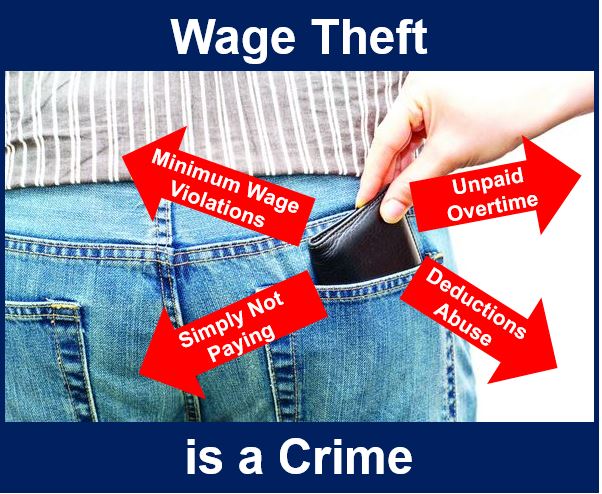Wage theft is the illegal practice of withholding wages from an employee. It is common among low wage workers and illegal immigrant workers.
Wage theft can happen in the following ways:
- No pay at all.
- Employee misclassification – this occurs when employees are misclassified as independent contractors.
- Not paying overtime.
- Deductions in pay.
- Minimum wage violations.
 Wage theft, like pick-pocketing, is stealing other people’s money.
Wage theft, like pick-pocketing, is stealing other people’s money.
Wage theft violates the rights that workers in the US have been guaranteed by the Fair Labor Standards Act (FLSA) in 1938.
The FLSA states that employees are entitled to be paid overtime at least time and one-half times pay for all time worked for more than forty hours per week. There are a few exemptions to this rule (such as public service agencies).
Even though there are regulations in place that are supposed to make sure employees are compensated properly for working overtime, millions are not.
A 2009 study of workers in 12 different types of occupations in the uS found that over half of all workers surveyed were never paid the time-and-a-half overtime rate.
It is illegal in the US to deny pay or to underpay workers. Some states across the country, such as California, have enacted their own Wage Theft Protection Acts in an attempt to address the issue.
A recent report estimated that wage theft is costing US workers about $50bn annually.
According to Ross Eisenbrey, Economy Policy Institute Vice-President, who authored a report on wage theft:
“Wage theft affects far more people than more well-known crimes such as bank robberies, convenience store robberies, street and highway robberies, and gas station robberies combined, and can be absolutely devastating for workers living from paycheck to paycheck.”
“For low-wage workers, the wages lost from wage theft can total nearly 10 percent of their annual earnings.”
Video – Wage theft amounts to many billions each year
